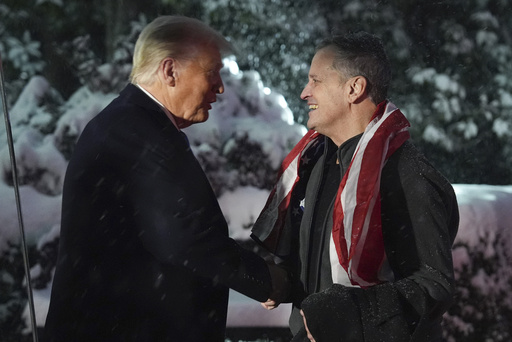
WASHINGTON — Marc Fogel, an American educator previously labeled as wrongfully detained by Russia, has successfully returned to the United States. This development is being interpreted by the White House as a potential thaw in diplomatic relations that could further discussions aimed at resolving the ongoing conflict in Ukraine.
Special envoy Steve Witkoff, representing former President Donald Trump, left Russia with Fogel, who is a history teacher from Pennsylvania, and brought him to the White House for a heartfelt reunion with Trump. “I feel like the luckiest man on Earth right now,” proclaimed Fogel at the White House, donning an American flag over his shoulders.
Fogel expressed his immense gratitude to Trump, anticipating a joyful reunion with his family later in the day. Trump added that another American would also be released on Wednesday, though he withheld the name and details of that individual, referring to them as someone “very special.”
Fogel’s ordeal began in August 2021 when he was detained under charges related to traveling with medically prescribed marijuana. After serving a 14-year sentence, he was classified as wrongfully detained by President Joe Biden’s administration in December of that year. National Security Adviser Michael Waltz mentioned that the U.S. and Russia had engaged in negotiations for Fogel’s release, but he did not provide specifics about the terms of the agreement. Such negotiations have previously involved the reciprocal release of individuals by both nations.
Waltz remarked that this milestone signified progress toward resolving the devastating conflict in Ukraine. Trump, a Republican, has expressed his commitment to seeking solutions to end the war, emphasizing the importance of good relations with Russian President Vladimir Putin, who initiated a full-scale invasion of Ukraine in 2022. In a press briefing at the White House, Trump remarked, “We were treated very nicely by Russia, actually. I hope that’s the beginning of a relationship where we can end that war.” When questioned about any concessions made by the U.S. in these negotiations, Trump responded that it was “not much,” without providing further details.
Fogel’s family expressed overwhelming relief and gratitude over his return home. They described this time as the most harrowing chapter of their lives but expressed hope for the future. “For the first time in years, our family can look forward to the future with hope,” they stated.
No immediate response from Moscow concerning Fogel’s release was available at the time.
In August, a significant prisoner exchange took place involving multiple nations, leading to the release of several detainees, including Wall Street Journal reporter Evan Gershkovich and corporate security executive Paul Whelan. However, many Americans remained incarcerated, like Fogel, with others still facing legal challenges, such as Ksenia Khavana, a dual U.S.-Russian national sentenced for treason following a minor donation to a charity supporting Ukraine.
The conflict enters its third year, and while Trump’s strategy for achieving peace remains unclear, he has suggested that concessions will be necessary from both sides, including possible territorial losses for Ukraine.
Fogel’s release, coupled with Trump’s announcement of sending Treasury Secretary Scott Bessent to Kyiv for discussions with Ukrainian leaders, indicates that discussions might be gaining traction. Key officials, including Vice President JD Vance, Secretary of State Marco Rubio, and Trump’s special envoy for Russia and Ukraine, retired General Keith Kellogg, are slated to attend the Munich Security Conference later this week, where Ukraine remains a primary focus.
Kellogg mentioned that they would engage with European leaders to outline Trump’s vision and gauge their interest in what that would entail. “When we come back from Munich, we want to deliver to the president the options so that he knows what it will look like for him when he gets directly involved in the peace process,” he stated.

